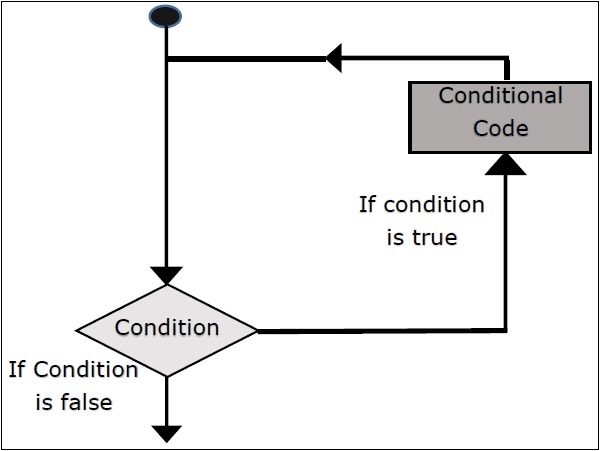- php 循环语句 - Javascript (1)
- php 循环语句 - Javascript 代码示例
- javascript 循环语句 - Javascript (1)
- PostgreSQL – 循环语句(1)
- PostgreSQL – 循环语句
- javascript 循环语句 - Javascript 代码示例
- javascript 循环和 if 语句 (1)
- c# 语句 - C# (1)
- 语句 - C++ (1)
- Scala Break语句(1)
- Scala 中的 Break 语句
- Scala Break语句
- Scala 中的 Break 语句(1)
- Scala 中的 For 循环
- Scala 中的 For 循环(1)
- scala中的循环方式(1)
- javascript 循环和 if 语句 - 任何代码示例
- c# 语句 - C# 代码示例
- 语句 - C++ 代码示例
- scala中的foreach循环 (1)
- COBOL 中的循环语句
- COBOL-循环语句
- COBOL 中的循环语句(1)
- COBOL-循环语句(1)
- scala代码示例中的循环方式
- Scala While循环
- Scala While循环(1)
- Scala 中的包(1)
- Scala集
📅 最后修改于: 2020-11-02 04:44:05 🧑 作者: Mango
本章将带您了解Scala编程语言中的循环控制结构。
在某些情况下,您需要多次执行一个代码块。通常,语句是按顺序执行的:函数的第一个语句首先执行,然后第二个执行,依此类推。
编程语言提供了各种控制结构,允许更复杂的执行路径。
循环语句使我们可以多次执行一个语句或一组语句,以下是大多数编程语言中循环语句的一般形式-
流程图

Scala编程语言提供以下类型的循环来处理循环需求。单击表中的以下链接以检查其详细信息。
| Sr.No | Loop Type & Description |
|---|---|
| 1 |
Repeats a statement or group of statements while a given condition is true. It tests the condition before executing the loop body. |
| 2 |
Like a while statement, except that it tests the condition at the end of the loop body. |
| 3 |
Executes a sequence of statements multiple times and abbreviates the code that manages the loop variable. |
循环控制语句
循环控制语句从其正常顺序更改执行。当执行离开作用域时,在该作用域中创建的所有自动对象都将被销毁。由于此类Scala不像Java那样支持break或continue语句,而是从Scala 2.8版开始,因此有一种方法可以打破循环。单击以下链接检查详细信息。
| Sr.No | Control Statement & Description |
|---|---|
| 1 |
Terminates the loop statement and transfers execution to the statement immediately following the loop. |
无限循环
如果条件永远不会为假,则循环将成为无限循环。如果您使用的是Scala,则while循环是实现无限循环的最佳方法。
以下程序实现了无限循环。
例
object Demo {
def main(args: Array[String]) {
var a = 10;
// An infinite loop.
while( true ){
println( "Value of a: " + a );
}
}
}
将以上程序保存在Demo.scala中。以下命令用于编译和执行该程序。
命令
\>scalac Demo.scala
\>scala Demo
输出
如果将执行上述代码,它将进入无限循环,您可以通过按Ctrl+来终止。 C键。
Value of a: 10
Value of a: 10
Value of a: 10
Value of a: 10
…………….